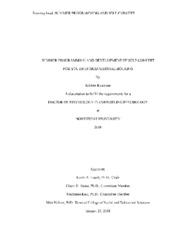Summer Programming and Development of Self-Concept for Youth in Transitional Housing
Abstract
Research that demonstrates the effectiveness of out-of-school time (OST) programs for at-risk youth is discussed. Participants in OST programs have demonstrated emotional, social and academic benefits as well as risk behavior reduction. Frequency of attendance and duration has a correlation with long-term outcomes. This study evaluated outcomes for formerly homeless youth participants in a summer recreational program using the Piers-Harris Self-Concept II Scale. Results did not provide a single combination of factors to reach statistical significance in Behavioral Adjustment, Physical Appearance and Attributes, Freedom from Anxiety, Popularity, and Happiness and Satisfaction. However, Intellectual and School Status reached small-to-medium effect size. Both genders demonstrated lower average scores at the end of the program, indicating that their perceived ability to do well in scholastic endeavors decreased over the duration of the program.
Original item type
PDF
Original extent
46 pages
Collections
Copyright
This original work is protected by copyright. Copyright is retained by the author(s). Works may be viewed, downloaded, or printed, but not reproduced or distributed without author(s) permission.


 Maintained by the Northwest University Library
Maintained by the Northwest University Library